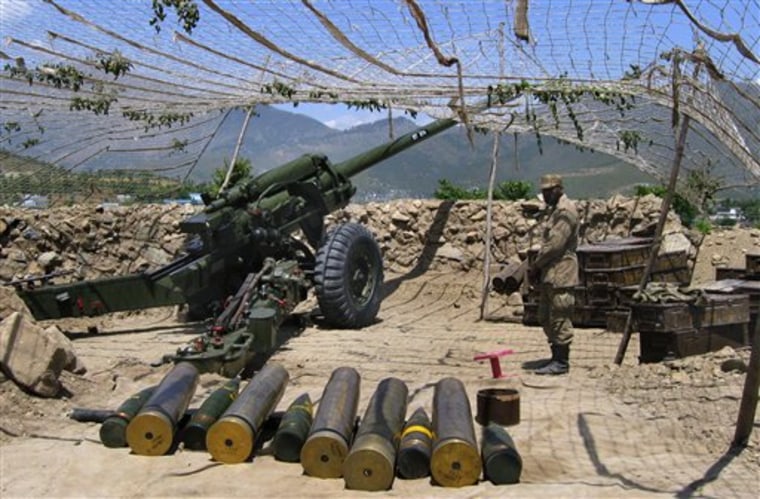Pakistani airstrikes killed dozens of Taliban fighters in a fierce struggle to drive them from a district near the capital, while the militants took over police stations and kidnapped more than 50 security forces, the army said Wednesday.
One member of the security forces also died, the top military spokesman said.
Also Wednesday, a suspected U.S. missile killed at least five alleged militants in South Waziristan tribal region near Afghanistan, while shootouts in the volatile southern Pakistani city of Karachi killed at least 20 people.
Pakistan is acting under intense U.S. pressure to take a tougher line against Islamist militants expanding from the strongholds along the Afghan border, where al-Qaida leaders including Osama bin Laden may also be hiding.
Government forces have begun trying to force the Taliban back into the Swat Valley, from where they had pushed out in the direction of an increasingly nervous Islamabad under the cover of a controversial peace process.
Commandos take town
Maj. Gen. Athar Abbas said helicopters inserted commandos into the main town in Buner, a once-peaceful farming region in the northwest, on Wednesday morning just as ground troops fought their way in from three directions against an estimated 450-500 militants.
Militants were putting up stiff resistance and detonated three roadside bombs near the Ambela Pass, a key gateway to the mountainous region. Three more troops were injured, he said.
After warplanes struck late Tuesday, attack helicopters engaged “miscreants” and killed more than 50, Abbas told reporters in Rawalpindi, south of Islamabad.
Rather than fleeing, militants seized three police stations in the north of Buner on Tuesday and kidnapped 70 police and paramilitary troops, he said. Eighteen of the troops were “recovered” Wednesday, he said, giving few other details.
Security forces prevented some reporters from entering the area and telephone services were interrupted, making it hard to verify the army’s account of the fighting.
The Taliban advance into Buner brought them to within 60 miles of the capital, Islamabad, raising concern about the stability of the nuclear-armed country. The army also says troops have killed scores of militants in recent fighting in Lower Dir, another area neighboring Swat.
Both lie within Malakand, the region covered by the government’s much-criticized peace deal. Officials agreed to impose Islamic law in return for peace in a region devastated by two years of bloody fighting.
Stemming 'encroachment'
Pakistani officials said the Islamic law concession robbed the militants of any justification for retaining their arms.
But officials in Washington, which is propping up Pakistan’s army and government with billions of dollars and worrying about the rising insurgency in neighboring Afghanistan, have slammed the peace process as a surrender and welcomed the resumption of military action.
The Pakistani offensives are “exactly the appropriate response” to the Taliban advance, Pentagon spokesman Geoff Morrell said Tuesday.
“We are hopeful and encouraging of the Pakistani military that they are able to sustain these operations against the militants and to stem this encroachment on the more populated areas of Pakistan.”
Drone attacks
The Obama administration has an opportunity to reiterate that demand when Pakistani President Asif Ali Zardari joins his Afghan counterpart in Washington for talks next week.
The subject of U.S. missile strikes may also come up. Pakistan has publicly protested the drone-fired attacks, though analysts suspect the two countries have a secret deal allowing them.
Two of the five suspected militants killed in Wednesday’s strike on a vehicle in the Kani Guram section of South Waziristan were foreigners, said two intelligence officials who requested anonymity because they were not authorized to speak to media. Four people were wounded, they said.
Mohammad Ayub, a tribesman living nearby, said a drone was flying in the area just before the evening prayers. Soon after the strike, Taliban militants surrounded the scene, he said.
Reflecting alarm in Western capitals at the advance of extremists into Pakistan, British Prime Minister Gordon Brown told lawmakers Wednesday that Britain would boost aid spending to support efforts aimed at rooting out terrorists.
“The greatest international priority is the border areas of Afghanistan and Pakistan,” Brown told the country’s House of Commons, calling the frontier a “crucible of terrorism.”
Government officials said Britain would spend around $980 million to bolster governance, education and health, half of it in the country’s Northwest Frontier Province and tribal belt.
Siding with the West
Pakistan has waged several offensives in the border region since turning against its former Taliban allies and allying with the U.S. following the Sept. 11, 2001 terrorist attacks.
But the operations resulted in the deaths of hundreds of civilians and the flight of hundreds of thousands of others, and were often halted by short-lived peace deals from which militants emerged stronger than before.
Amnesty International estimated Wednesday that at least 33,000 civilians have fled their homes in Lower Dir alone.
Witnesses told of bodies left lying in the fields because residents were too scared to move them, the rights groups said. At least five civilians died, it said.
In violence elsewhere in Pakistan on Wednesday, at least 20 people were killed and two dozen vehicles torched in different sections of the southern city of Karachi, officials said.
Ethnic violence was a suspected trigger of the shootouts in Karachi, a teeming city with a history of such clashes between Pashtuns and descendants of migrants from India.
Mashooduz Zafar of the Abbasi Shaheed Hospital said 11 bodies were taken there, another nine bodies of gunshot victims were at Jinnah Hospital, official Kalim Butt said.
Provincial minister Faisal Sabzwari said two security force members were wounded in the sporadic firing.
